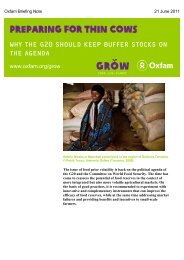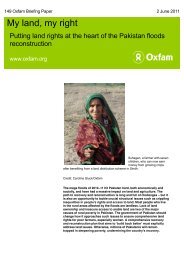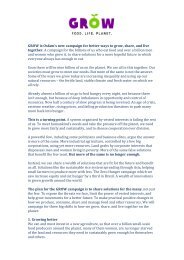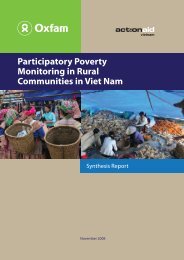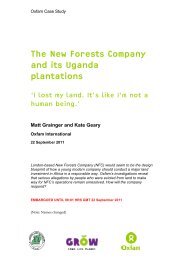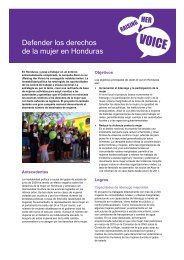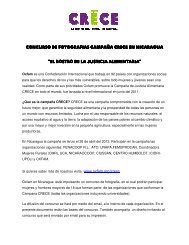Untitled - Oxfam Blogs
Untitled - Oxfam Blogs
Untitled - Oxfam Blogs
You also want an ePaper? Increase the reach of your titles
YUMPU automatically turns print PDFs into web optimized ePapers that Google loves.
Impacts of Price Hikes on the<br />
Lives and Livelihoods<br />
of Poor People in Viet Nam<br />
Low salary – Enterprises are short of labour<br />
Enterprise having “insufficient labour at the start of year and sufficient labour at the end of the year” is<br />
a common phenomenon in Go Vap district, HCMC. Enterprises regularly seek to recruit labour through<br />
much of the year and are able to reach the highest rate of labour around the third and fourth quarters.<br />
After the Tet holiday only 75-80 percent of workers return to work as the salary is low and the working<br />
conditions inappropriate. Some enterprises withhold salaries in January and defer the thirteenth month<br />
bonus payment. However, they still cannot keep the workers because of escalating costs of living in<br />
HCMC. A good example is a shoe making enterprise located in ward 17. The enterprise regularly<br />
announces vacancies with a monthly salary of 1.5 million VND/month. After seven months (as of July)<br />
they still haven’t recruited the 50 workers they need.<br />
As the urban poor become worse-off the providers of goods and services (low-end food sellers, tailors,<br />
street vendors and shop-keepers) also suffer as their sales fall and profits decline. They have to offer<br />
“competitive prices” in order to keep their clients.<br />
Tailors lose migrant worker clients and are not able to find other jobs<br />
Mrs. M. is a tailor in Niem Nghia ward, Le Chan district, Hai Phong. The house was given to her by her<br />
parents in 2002. Her main clients are workers from shoe making enterprises located in the same ward.<br />
She charges them half as much as tailors in the main streets do for the same service. She has observed<br />
a fall in the number of clients “as their salary is too low compared to last year while the cost of living<br />
has gone up. They have cut down on clothing expenditure. The number of orders I receive now are<br />
only one tenth of before”.<br />
She now sells mobile SIM cards “which are still trivial”. Her husband hires a booth in the park and<br />
works as a photographer. However his income is “unstable and depends on weather conditions. Also<br />
very few people want to take photos now”. Mrs. M has tried selling grilled sausages in front of the<br />
kindergarten which brings her a few tens of thousand VND per day. However she is afraid of being<br />
arrested by the police because the city has banned street food sellers. She says “I have tried this job<br />
for the last two months and I have been arrested twice. Each time I had to pay a fine of 100,000 VND.<br />
I still have to continue despite of the fear of being arrested again”.<br />
Low-end restaurants under price pressure<br />
Mrs. P.T.H., Nguyen Van Linh road, Niem Nghia ward, Le Chan district, Hai Phong. Mrs. H is 45 years<br />
old. Her husband divorced her in 2000 and left her with the three small children. Her only source of<br />
income is from the low-end restaurant she runs with her sister in law. Since 2000 the two women have<br />
managed a good business. Many clients are construction and electricity workers. The restaurant has a<br />
reputation for reasonable prices, good services and good sanitation.<br />
Since the Tet holiday the price of rice, meat and vegetable has risen. Mrs. H noted “Before Tet we<br />
cooked 8-9 kgs of rice a day for more or less 50 clients. After Tet as the price of everything increased<br />
many of the workers started to bring their own lunch (basically rice and vegetables) to work in order<br />
to save money. Some even arranged to prepare group lunches to minimize costs. We now only cook<br />
five kgs of rice a day. Although prices of rice, meat and vegetables have all doubled we can not charge<br />
them as much because if we do I am afraid they will stop coming and prepare their own meals instead.<br />
We manage to maintain the same standard of meals and only charge an extra of 1,000 VND (from<br />
5,000 VND to 6,000 VND now), yet the number of clients has decreased by a third. The workers<br />
themselves come from poor families. Their salaries are very low and their jobs are sometimes seasonal<br />
so as prices increase they have to try to save even more. Recently we have seen a group of female<br />
workers coming and ordering food together. They order rice, tofu, fish and vegetable soup to share<br />
and each of them only pays 5,000 VND”.<br />
Mrs. H also has to work harder in order to cut down on costs “the two of us have to go to three markets<br />
altogether and pick things wherever we find cheaper. For example, we buy vegetables from An Duong<br />
66



